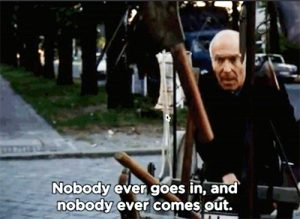 In Part 1 of this series, I discuss the importance of the law of reciprocity. If a relationship isn’t reciprocal, it will eventually become a source of anger and resentment. Healthy relationships can’t exist on a one-way street paved with double standards.
In Part 1 of this series, I discuss the importance of the law of reciprocity. If a relationship isn’t reciprocal, it will eventually become a source of anger and resentment. Healthy relationships can’t exist on a one-way street paved with double standards.
Part 2 explains the joy of saying no. I discuss secondary gains and losses to saying no and developing boundaries. Telling a partner or friend no can be incredibly difficult for codependents for a number of reasons. For example:
- The desire to be seen as the nice guy or good girl.
- Trying to avoid feeling FOG (fear, obligation, guilt).
- An attempt to hold onto relationships.
- Maintaining one’s dysfunctional relationship roles.
Some clients and website/YouTube audience members still don’t quite understand what boundaries are and their importance. Therefore, I’ll try to make this installment as basic as possible.
What are boundaries?
The ability to set healthy personal and interpersonal boundaries are the cornerstone of strong adult relationships based on mutual respect. Equally important is the ability to identify and respect the boundaries of others. A lack of personal boundaries and a failure to recognize and respect a partner’s boundaries is typical in relationships between codependents and the personality disordered.
A boundary is an invisible fence with a gate that you erect around yourself. It keeps the bad stuff out and lets the good stuff in. It’s a wall of protection around your personal security, self-respect and your identity. Good boundaries decide who you let in your life, how often, how far and what you will and won’t tolerate regarding how others treat you. They also help you to distinguish your emotions, feelings and beliefs from the emotions, feelings and beliefs of others. This is especially important when dealing with people who project and manipulate others through guilt and shame.
Boundaries help you determine when to say yes or when to say no to what’s being asked of you with authority and conviction. Most importantly, good boundaries all but ensure that you attract people who won’t take advantage of and harm you in the first place. Boundaries are your best protection against users, manipulators, narcissists, borderlines and other predatory personalities.
How do you learn to have boundaries?
How do you learn the majority of ways you relate to yourself and others? From your parents! If you were fortunate to have good enough parents, you’re probably not reading this. Unfortunately, many people had moms and dads who not only weren’t good enough, but have serious issues. For example, personality disorders, mental illness, addictions and codependency. If your parents weren’t capable of helping you develop boundaries as a child, for whatever reason, there’s no time like the present to learn.
How do children learn to have boundaries?
1. By having healthy role models.
Ideally, healthy boundaries are learned in childhood from good enough parents. Mom and dad model (i.e., teach by example) interpersonal boundaries for their kids. For example, not tolerating disrespect or abuse from others. Of course, this requires parents to both have and be cognizant of their own boundaries.
2. By developing empathy and self-awareness.
Parents teach kids boundaries by helping them develop empathy and self-awareness. Self-awareness helps children to identify their own feelings and needs. Empathy makes it possible for a child to consider and understand the feelings and needs of others as well as how their own behavior impacts others. The same is true of empathy and self-awareness in adults.
This is why it’s impossible to have healthy reciprocal, mutual relationships with narcissists, borderlines and psychopaths. They simply lack consistent empathy and self-awareness. Combine that with zero personal accountability and it’s the kiss of death. To quote my former therapist, you can’t plant turnip seeds and expect to grow carrots.
3. By talking about it and practice.
Good enough parents also teach kids about healthy boundaries by explicitly talking about it. It’s never too early to discuss this with children. Use age appropriate language and examples kids can understand. Start by asking the child what feels comfortable and what feels uncomfortable to them in terms of their relationships with others, their feelings and their physical space.
Validate their feelings and don’t shame the child for having them. Role-playing situations in which boundaries are necessary is another effective way to help kids develop boundaries. For what it’s worth, I often do this with adult clients because their parents didn’t help them with this when they were kids. If you’re in the same boat, it’s nothing to feel embarrassed by. I’ve had to learn this stuff as an adult, too.
Boundaries can be rigid, diffuse or healthy. What are the differences?
Boundaries may change depending on where you are (e.g., work, school, home or the gym). Effective boundaries may differ based upon the person with whom you’re interacting (e.g., your boss, partner, brother, child, rabbi/pastor or neighbor). Some of your boundaries will also change over time as a relationship changes.
For example, when you first meet someone you don’t divulge your deep, dark secrets and relationship history. As time passes, and you increasingly get to know and trust one another, you reveal more about yourselves. This is a red flag many clients miss. They meet a potential mate for the first time and are regaled with damsel/dude in distress du jour’s full trauma history. Codependents often misinterpret this kind of oversharing to mean the damsel/dude sees them as “special” rather than seeing it for what it is — an absence of boundaries and manipulation.
First, let’s distinguish between the quality of boundaries:
1. Rigid.
 Rigid boundaries are boundaries without a gate, ladder or tunnel. It’s like Wonka’s Chocolate Factory — nobody ever goes in, and nobody ever comes out. Rigid boundaries usually develop out of fear. Fear of intimacy, getting too close, becoming too attached, failure and rejection. People with rigid boundaries are usually deeply afraid of being hurt, so they keep others at a distance.
Rigid boundaries are boundaries without a gate, ladder or tunnel. It’s like Wonka’s Chocolate Factory — nobody ever goes in, and nobody ever comes out. Rigid boundaries usually develop out of fear. Fear of intimacy, getting too close, becoming too attached, failure and rejection. People with rigid boundaries are usually deeply afraid of being hurt, so they keep others at a distance.
This is common in both the personality disordered and the codependent, with some differences, of course. Because narcissists and borderlines are often hypocrites who enjoy double standards in their relationships, they often have extremely rigid boundaries when it comes to how people treat them. They rarely, if ever, recognize and/or respect the boundaries of others. Remember, it’s different when they do it!
Some codependents who’ve been terribly hurt and don’t want to be disappointed in love again, often retreat behind a wall and may not venture back out. Or, they periodically venture into the dating pool out of loneliness. Then, when their fears are activated, retreat behind their walls again. This is incredibly sad. Clients who do this are engaging in black and white thinking. They believe “all women,” “all men” or “all relationships” are like the ones that hurt them. In reality, if they’d learn to have healthier boundaries and, thus, chosen healthier partners, they wouldn’t be self-protecting to the point of cutting themselves off from relationships.
2. Diffuse.
By diffuse, I mean like Swiss cheese. Diffuse boundaries are quite common in codependent people. Many of my clients have boundaries, but they’re inconsistent. Sometimes they have them; sometimes they don’t. They enforce their boundaries only after they become angry enough to do so. Of course, if they’d been consistently enforcing their boundaries all along they probably wouldn’t have reached such a pique of anger.
They allow a narcissistic or borderline partner to bully and bulldoze them for stretches of time, and then — BOUNDARIES! This is often done in a state of agitation and frustration. Naturally, the situation gets flipped around and they’re labeled the angry jerk. Boundaries are best stated and enforced in a calm authoritative manner. Most people tune out whiny nagging and yelling. If you don’t clearly and consistently enforce your boundaries, why should anyone respect them? This is why kids ignore parents who don’t parent consistently.
People with diffuse boundaries are often emotionally enmeshed with their partners and their children (this is bad!) Enmeshment is a term introduced by family therapy pioneer Salvador Minuchin. Emotional enmeshment is common in dysfunctional families and codependent adult relationships. There’s a lack of differentiation between your partner’s feelings and your own. In this respect, one person feeds off the emotions of the other.
Diffuse boundaries are characterized by having a difficult time saying no and try to “save” others and fix other people’s problems. People with diffuse boundaries are also easily drawn into the drama, crises, conflicts and chaos of others. This is why I ask many clients to memorize the following statement: “Wow. That must be difficult for you. What are you going to do about it?”
3. Healthy
As previously stated, healthy boundaries make it possible for you to recognize your limits, sense of comfort vs. discomfort, your feelings and beliefs and help you assert them with clarity and conviction. Having healthy boundaries also helps you recognize and respect the boundaries of others and their right to assert themselves. Healthy boundaries are neither rigid nor diffuse. They’re both strong and flexible as determined by the situation and nature of your relationship with specific people.
Kinds of boundaries.
Just as there are different kind of relationships, people have different kinds of boundaries. There are six primary categories. Material, physical, emotional, intellectual, spiritual and sexual.
1. Material.
Material boundaries determine how you treat and allow others to treat your physical property. Do you lend others money, books, tools, clothes, etc? What are your rules about allowing friends and family to borrow your property? Do you have any rules? I went from having no rules — allowing all friends to borrow books, CDs and clothes (in high school and college) — to having very specific rules.
For example, I don’t lend anyone money anymore. Period. No exceptions. I only lend possessions I can replace. And only to people I’ve known long enough to trust with my possessions. Additionally, I’m up front regarding my expectations (i.e., return it in the condition it was borrowed) and when I expect to have my possessions returned.
2. Physical.
Physical boundaries determine how you manage your body and personal space. Do you practice good physical self-care or do you disrespect and mistreat your body? Who do you let touch you and to what degree? Hug? Pat on the back? Handshake? Kiss on the cheek? How comfortable are you letting someone sit or stand close to you?
Who are you comfortable having in your home or car? Do friends, family, colleagues and acquaintances respect these boundaries? Or do they touch you and/or encroach on your space even after you tell them what the boundary is? Do you tell them what the boundary is or tolerate the unwanted closeness or touch?
Do you prefer to shut the bathroom door when using it? Some people keep it open, which I’ve always found strange. Many clients’ partners demand the bathroom door stay open, lest they commit adultery while pooping. In other words, what are your privacy boundaries? You have a right to privacy, even when in a relationship.
3. Emotional.
Healthy emotional boundaries require that you have emotional self-awareness. Can you identify your feelings? Do you understand where they come from? Are they related to something in the past, or are they strictly related to your present situation? Do you feel guilty for other people’s unhappiness, disappointment or anger? Even when you’ve done nothing to cause it?
Does the other person expect you to take on their feelings as your own, or do you do that without prompting? It’s possible for people to state their feelings to each other without personalizing and taking them onto yourself. Do you personalize other people’s behavior and comments? Even when it doesn’t have anything to do with you? If someone is rude to you, that’s about them, not you.
Strong emotional boundaries help you avoid taking on other people’s problems. You can feel empathy and compassion for someone and without leaping to rescue them or taking on their battles for them. When you have good emotional self-awareness you’re less easily drawn into the blame game — accepting blame or blaming others. You take responsibility for yourself, your choices, your words and actions. Diffuse emotional boundaries foster emotional dysregulation and reactivity. Rigid emotional boundaries obstruct human connection and lead to isolation and loneliness.
4. Intellectual.
Healthy intellectual boundaries allow you to think for yourself and determine your own beliefs, values and opinions. Good self-awareness is essential to having good intellectual boundaries. Do you have the courage of your convictions? Or, are you easily swayed when someone states a contrary opinion? Do you agree with others when you disagree for fear of upsetting them or losing the relationship?
How well are you able to manage cognitive dissonance? In other words, do you lose your marbles when someone expresses different views or holds different beliefs? Do you quickly dismiss the other person? Become emotionally reactive — i.e., angry, enraged, tearful, sullen or resentful? When you have good intellectual boundaries, you’re able to tolerate differences of opinion or, for example, political beliefs. You’re also able to distinguish between objective facts and subjective opinions and feelings.
5. Sexual.
Healthy sexual boundaries are similar to healthy physical boundaries. How well do you know your sexual comfort levels? Are you able to say no to people and/or activities and kinds of touch you dislike or make you feel uncomfortable? Can you clearly say no without feeling guilt or fear? Are you able to clearly express what you like and don’t like? Do you respect a partner’s sexual likes, dislikes and no-fly zones without judging and shaming them?
Which leads to a common problem many of my male clients experience. They respect their wives’ sexual boundaries (as in no sex) and, as a result, are in long-term sexless marriages. Their partners have shamed them just for wanting to have sexual intimacy. While I’m not in their bedrooms, from their self-reporting, these guys are asking for pretty basic stuff. The rejection, shame and then resentment and anger these men feel is incredibly painful. Instead of owning their own lack of sexual interest, hang-ups and/or dysfunction, these women project it onto their husbands. Shaming a partner for desiring intimacy and a healthy sex drive is cruel.
6. Spiritual.
Having healthy spiritual boundaries is a variation on intellectual boundaries. Do you know your spiritual or religious beliefs? Can you adhere to them or waiver when you encounter someone who disagrees with you? Do you become emotionally reactive when you’re met with someone who holds different beliefs and practices? Are you able to respect the spiritual beliefs of others or do you judge and demonize them?
Conclusion.
These are the nuts and bolts of boundaries. When you have the time, go back to the beginning of the article and do a self-evaluation. Ask yourself:
- What are your boundaries?
- With whom are you able to easily enforce them? Who consistently ignores them and disrespects you?
- Are your boundaries rigid, diffuse or healthy?
- How do your boundaries change in different situations and with different people?
- Do you experience emotional reactivity with specific kinds of boundaries? For example, intellectual or emotional?
- Are you easily drawn into other people’s problems and dramas?
- Have you withdrawn from people altogether to avoid learning to have healthier boundaries and relationships in order to avoid being hurt again?
- Which areas of your life and relationships could use some improvement?
If your parents didn’t develop healthy self-awareness and boundaries in childhood, it can be difficult to do as an adult. Difficult, but definitely possible. I sometimes recommend clients read books on parenting. Not for their children, but for themselves. It can help you learn how to teach yourself what your parents did not. Hope this helps!
 Counseling, Consulting and Coaching with Dr. Tara J. Palmatier, PsyD
Counseling, Consulting and Coaching with Dr. Tara J. Palmatier, PsyD
Dr. Tara J. Palmatier, PsyD helps individuals work through their relationship and codependency issues via telephone or Skype. She specializes in helping men and women trying to break free of an abusive relationship, cope with the stress of an abusive relationship or heal from an abusive relationship. She combines practical advice, emotional support and goal-oriented outcomes. Please visit the Schedule a Session page for professional inquiries or send an email to shrink4men@gmail.com.
 Want to Say Goodbye to Crazy? Buy it HERE.
Want to Say Goodbye to Crazy? Buy it HERE.
Leave a Reply
You must be logged in to post a comment.